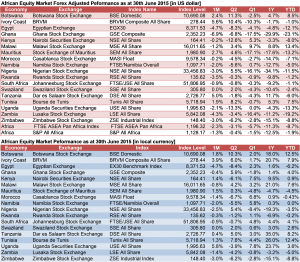When investors think about ETFs, most are focused on the nearly 2000 products that trade within US markets and leading countries in the EU; few realize that Africa is no longer just a ‘Frontier Market’, and some go as far to argue that Africa (once again?) represents a burgeoning investment marketplace.
Aside from various market prognosticators who are promoting the “Into Africa” message, local exchanges across the region are taking steps to convey that very same message. According to recent reports, talks are under way between market participants in South Africa, Nigeria and Kenya to launch the cross listing of exchange traded funds (ETFs), a move that is intended to lead to improved liquidity on Africa’s exchanges.
While many know The Market Vectors Africa Index ETF (NYSEARCA:AFK) for being perhaps the most efficient way to express exposure to the entire region, ETF issuers are working to cross list new and existing ETFs on other exchanges, while the exchanges themselves are putting in place the right frameworks to enable this.
The concept of cross listing an ETF is the same as cross listing a share, or listing it on more than one exchange. It provides domestic investors with access to opportunities from another market, in the convenient and cost effective form of an ETF. By cross listing ETFs on African exchanges, investors will be given access to liquid company shares tracked by indices such as the FTSE/JSE Top 40, the FTSE/NSE Kenya 15 Index, and the MSCI/Nigeria.
 Africa’s Fastest growing asset class: Exchange-Traded Funds
Africa’s Fastest growing asset class: Exchange-Traded Funds
“ETFs are one of the fastest growing asset-class categories in the world. By collaborating with Africa’s largest stock exchanges, we hope to spearhead this trend in Africa,” explains Donna Oosthuyse, the director for capital markets at the JSE.
Added Oosthuyse, “The cross listing of ETFs will fulfil two main functions: investors will have exposure to a diverse range of top-performing South Africa, Nigerian and Kenyan companies in a convenient and cost-effective way; and the cross-listings of ETFs will improve the liquidity of Africa’s largest stock exchanges.” Oosthuyse says that the advantages for companies included in the ETF indices, and for the exchanges from whence they come, are that ETFs need to be “fully covered”. “This means that the asset manager that is managing the ETF portfolio has to buy and sell the underlying shares on the home exchange, depending on the activity of buying and selling of the ETF.”
Home market liquidity
If an ETF from Kenya or Nigeria, for instance, is listed on the JSE, she adds, then the asset manager in Kenya or Nigeria has to buy and sell the constituent shares on the home market, as units in the ETF are bought and sold. This drives liquidity in the home market.
“In addition to this, it provides extra visibility on the shares on that exchange to new investors who in all likelihood don’t yet trade on that market.” Haruna Jalo-Waziri, the executive director of business development at the Nigerian Stock Exchange, says: “This collaboration underscores our commitment to providing investors with a wide range of investment products to help them realise their financial goals. ETFs are becoming attractive to many investors offering them portfolio diversification and reduced cost of investing.
Building African Financial Markets Seminar
Meanwhile, as part of an on-going effort to deepen and promote liquidity, choice of products and investor interest across African markets, the JSE and the African Securities Exchanges Association (ASEA), supported by the World Bank Group, will be hosting the third Building African Financial Markets Seminar from 16 to 18 September. The conference will gather key representatives from stock exchanges, regulatory bodies, stockbroking firms and other market participants from several African countries. Ideas on how to grow Africa’s capital markets will be discussed.
MarketsMuse.com editors invite you to read more: http://southafrica.info/africa/etf-africa-170815.htm#.VdNRUZcnhcQ#ixzz3jBJeRlbE

